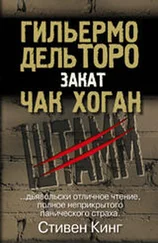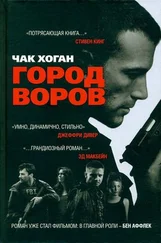The hallway elevator dinged down the hall. The BioCon security guard emerged wearing a contact suit and met Maryk at the desk.
“The girl inside,” Maryk told her. “She is not to be let out until I return.”
Panic welled up ahead of tears as she stood before Stephen Pearse and for a moment thought he was dead. His head was tipped to the side and his lifeless face was gray and broken with hot, black, suppurating sores. His left arm hung straight off his wheelchair as though reaching for the floor, his gaunt fingers blistered and grayed like infested wood. She called his name again. She pushed his armrest and shook the chair gently, and his eyes opened, and he righted his head slowly, in pain. He looked about himself blindly before finding Melanie, and by then she was composed in front of him.
The sore on his right eyelid was seeping reddened pus and threatened to close the eye. He raised his own arm onto his lap, and his mouth contorted in pain. Melanie placed the medication trigger in his hand and watched him thumb it twice.
She blurted out the short version of what had happened at the airport, then pulled over the chair and told it all again, in detail, from beginning to end. It was a relief to sort it all out verbally, and her telling it kept both of them occupied. Stephen’s attention faded at times, but Maryk’s name always succeeded in bringing him back.
He spoke hoarsely, and from the way he swallowed Ye she could tell that some obstruction was growing in the space of his throat. The act of speaking had never before seemed so complicated. What he said at first sounded like gibberish, and she thought his mind was gone. Then came the English translation of the Latin phrase, just above a whisper: “You may drive nature out with a pitchfork,” he said, “but she will keep coming back.”
“Or ‘he,’ ” she said, relieved by his apparent sanity.
“Zero has the pitchfork at Peter’s throat now. Peter must stop trying to fight the man. He must instead fight the virus.”
She said nothing, pitying her faith in Maryk. She offered Stephen a plastic cup of water, and his grinning lips closed on the straw. He swallowed and eased back.
“You should hate me, Melanie. You should strangle me as I sit here. I let the girl with vitiligo go out of the camp. I am the one who brought about your sickness. Your parents. Your town. I caused all this.”
“Stop,” she said.
“Maybe it all should end. You’ve thought so sometimes, Melanie. Who hasn’t? No more suffering, no more struggling.”
“Please stop,” she said, but his eyes had slipped from focus. The IV lines slithered off his trembling arms, and her eyes filled as she looked at the rotting mass of his body.
He came around strong again. It was like standing beside a carousel, watching someone swing past and fade away.
“He left me his bag,” he said. She looked around and saw Maryk’s black bag there on the counter, watching them, like a cat. “He only visits when I am asleep. It is fear, though he would never admit it. Fear of my sickness. Fear of what I am becoming. Do you know why he left me his wares?”
“I think so,” she said quietly.
“The poison in his needles. The great virus hunter cannot bring himself to kill me.” He faded and came around again. “What did you think when you sat with him in the airport? Did you hold his hand? Did you wish, just for a moment, that he was me dying here, and me him, and healthy?”
He looked so evil suddenly. His cruel words brought tears even though she knew they were not truly spoken by him. “Why are you so obsessed with Maryk?” she said.
He was silent a while, and still; oozing. The redness of his eyes made the tears dammed along the rims appear like blood, and for a moment, just for a moment, he looked like a despairing saint. He looked like Stephen Pearse again. “I thought you would have guessed by now,” he said, with deathly pride in his voice. “I am Peter Maryk’s conscience. I am that black heart he keeps locked away.”
The work cubicles of the C complex lab in the Genetic Engineering section of Building Four were constructed of floor-to-ceiling reinforced glass. Geist sat on a wheeled stool inside the immaculate bell of the center work station while Maryk paced in front of him. A row of pencils stood like sentinels in the front pocket of Geist’s lab coat. The photograph on his laminated ID tag had been taken before the laboratory accident that caused his radiation exposure. In it Geist still possessed a mop of straw-colored hair.
Maryk gave him the condensed version of Zero’s creation and evolution and watched the man’s already pale face blanch to distress. What sold Geist on the story were the gaps it filled in the news accounts of the World Congress Center and Hartsfield airport outbreaks. Geist contemplated the structural discrepancies in the Zero virus comparisons Maryk had put up on the station monitors.
“Absurdly active,” said Geist. “Fracturing itself and refracturing, almost like a zipper.”
“It originated from a radiation exposure in a central African cave.”
Geist took another took at the before-and-after scans. “It could conceivably be reinfecting its human host with each genetic shift.”
“Not a host,” Maryk said. “The virus battled the original host’s body to equilibrium. Plainville has infiltrated and converted every one of this man’s cells. Host and virus are one and the same.”
“But the virus has shifted too much for the human half. It must now be consuming its own body.”
“Would you say the virus is mutating out of control?”
“The deviations are dynamic, arrant — like a human going from two arms to one, or three. Mutations are a terrific shock to the system.”
“And enough of them...”
Geist nodded. “This virus is going to mutate itself right out of business. When too much damage has been done to the gene core, it will no longer be able to reproduce.”
“And without the ability to reproduce, a virus is no longer a virus.”
“Dead matter, incapable of infection. But this takes time.
“Yes,” Maryk agreed pointedly. “Time.”
Geist sat back and crossed his arms as slowly as any man Maryk had ever seen. “Why come to me now?” he said. “A man colonized by an iatrogenic mutation of an immunopathic retrovirus. A humanized virus vector poised to infect the world.”
“An artist was once asked, ‘If your studio was burning to the ground, and you could only save one thing, what would it be?’ ”
Geist shook his head impatiently.
“The true artist brings out the fire. I want to bring out the fire here, Geist. I want to isolate this flame by depriving it of oxygen, so I can stamp it out.”
The old distrust had returned. “With what?”
“Time. I need you to brew something for me, and I need it fast.”
Geist crooked his head for a different angle on Maryk. Then he grinned. “A bug,” he said. “You want to counterinfect. You want a bug you can deliver to Zero.”
“No,” Maryk said. “To Atlanta. I want to infect the city before Zero does.”
Geist’s informed grin fell.
Maryk said, “A virus needs hosts. It travels only on the backs of others, through contact and exchange. Tonight is New Year’s Eve — the single biggest night of casual human interaction. We’ve got to break up the party. We’ve got to eliminate Zero’s transmission by keeping people apart.”
Geist said, “You want to give Atlanta a city wide flu?”
“Zero is peaking. He is dying and his virus is failing — in time. He’s gone underground now because he is sick. He is resting somewhere in order to build up his strength for a night of widespread infection. He is ready to touch off a pandemic that will engulf the human race. I need to starve him out so I can find him and eliminate him. I need to shut down the city and its inhabitants for a day or two.”
Читать дальше












